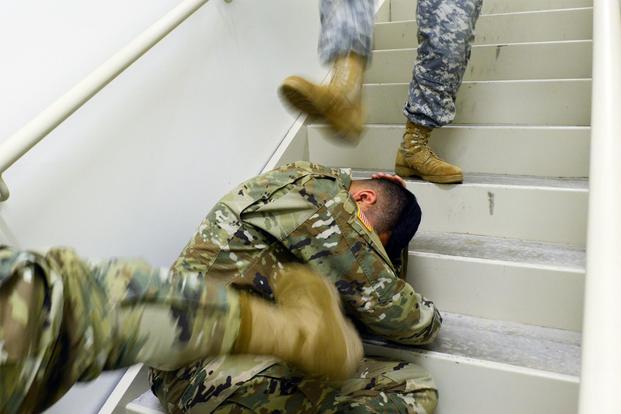Soldiers who were bullied or hazed while deployed for combat were significantly more likely to develop serious mental health issues, including depression and suicidal thoughts, according to new research.
A study published Tuesday online by JAMA Network Open found that roughly 12% of combat soldiers who were surveyed reported being bullied or hazed during deployment.
Some soldiers who faced harassment reported developing mental health conditions like major depression, explosive anger, post-traumatic stress, suicidal ideation and substance use disorder.
Read Next: Family of Decapitated Soldier to Sue Army over Unsolved Homicide
Even when researchers adjusted for other risk factors, such as socioeconomic backgrounds and medical histories, bullying or hazing during deployment appeared to increase the risk of developing these issues, according to the research.
"Approximately 1 in 8 soldiers reported that they had been bullied or hazed while deployed, suggesting the eradication of these behaviors could impact large numbers of service members during a critical time," wrote lead author Laura Campbell-Sills, a project scientist in the University of California, San Diego, Psychiatry Department, and others.
While nearly 90% of respondents were male, female soldiers reported hazing at higher rates than men. Also, younger service members, those who had reported previous PTSD or suicidal thoughts, and those who had other deployment and non-deployment stressors reported being bullied at higher rates.
The authors said they undertook the study because bullying has been associated in civilian workplaces with mental health disorders and suicidal ideation, but few studies have focused on the relationship between such behavior and mental health in military personnel.
The study used data from the Army's Study to Assess Risk and Resilience in Servicemembers, or STARRS, project -- a long-term study that follows troops and veterans across decades to examine harmful behavior and mental health conditions in soldiers.
In particular, it used a portion of the STARRS study of surveys conducted of soldiers April 1, 2011, to Nov. 30, 2012, and data from the first wave of the STARRS follow-on survey, conducted from Sept. 1, 2016, to April 30, 2018.
The respondents were asked questions about whether they were bullied or hazed during a combat deployment, if they had combat exposure and what their lifetime exposure was to traumatic events such as a sexual assault, life-threatening injury or death of a loved one.
The data did not show that the hazing or bullying caused the mental health disorders in those who reported developing them, but did show "significant association" between the behavior and poor mental health, meaning that those who said they were bullied or hazed reported mental health conditions at higher rates.
The authors warned that readers shouldn't assume that the bullying caused the mental health conditions listed, since the disorders may have predated victimization. They added that the survey also may be flawed as a result of poor or inaccurate recall of life events or mental health symptoms or hesitancy to report an experience that is stigmatizing, such as being a victim of bullying or being diagnosed with a mental health condition.
Given that bullying and hazing can be discouraged by Army leadership, the service should engage in prevention strategies and remain vigilant to ensure health and safety of service members, the authors noted.
"Although causality cannot be assumed, these results raise the possibility that U.S. Army policies and programs that aim to eradicate bullying and hazing may help reduce mental disorders and suicidality among soldiers," they wrote.
-- Patricia Kime can be reached at Patricia.Kime@Military.com. Follow her on Twitter @patriciakime.
Related: They Said the Rise in Military Suicide Is a Mystery. Traumatic Brain Injury May Be an Answer.













